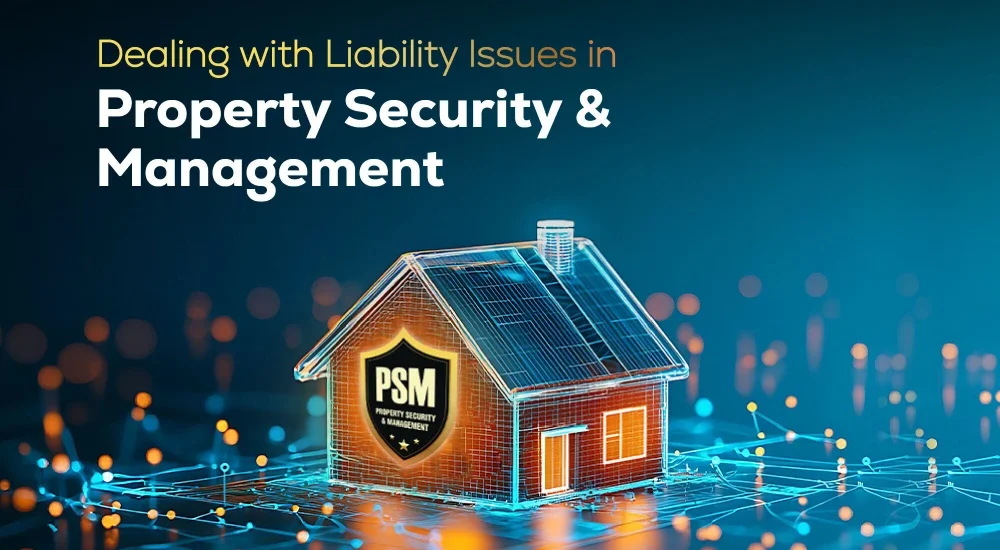- November 20, 2024
- Posted by: Humaira Urmi
- Category: Tips

In today’s fast-moving world, Property security management is much more than the installation of surveillance cameras and the hiring of security personnel.
A well-regarded business security management plan will protect assets and reduce liability exposure emanating from security breaches or accidents. Let’s look at how good security management could be used to reduce issues of liability and provide a safe environment for businesses and property owners alike.
Understanding Liability in Property Security
Liability, in terms of property security, is the legal responsibility of a property owner or manager for harm or damage incurred due to poor or ineffective security. It may manifest as theft, damage to property, or injuries due to lapses in the security of the premises.
If these vulnerabilities are not taken care of, they may lead to certain lawsuits and financial losses, not to mention the loss of reputation. Actions aimed at such risks must be made in advance to avoid such influence and just be on par with the law concerning all standards of safety.
![]()
Components of a Robust Security Management Plan
A security management plan means a planned plan of action or strategy toward the identification, assessment, and mitigation of security property risks. Important components that could assist in answering the liability concerns include:
1. Risk Assessment
Begin with a full-scale risk assessment regarding all the possible risks on the property, along with identifying weak spots in the security structure, like those areas with poor lighting, faulty gates, or limited coverage of surveillance cameras.
2. Customized Security Measures
Follow through with specific access control systems, security patrols, and real-time monitoring that help alleviate property vulnerabilities.
3. Regular Maintenance and Upgrades
Ensure security systems, including alarms and surveillance cameras, function optimally through regular inspections and upgrades to keep up with technological advancement.
4. Staff Training
Emergency procedure training for situations that might arise, suspicious activity observations, and instructions on how to operate security equipment will be provided to all security personnel and property management staff.
5. Legal Compliance
Be informed regarding current conditions of local laws and regulations that may have property security implications. Adherence to such can minimize liabilities from risk exposure and demonstrate a commitment to safety.
Mitigating Liability Risks

Documented Procedures: Maintain thorough documentation of security protocols, incident responses, and maintenance schedules. Records could be very important in refuting liability claims.
Clear Communication: Post visible signage regarding security measures and review safety protocols to reduce the potential for accidents with tenants, employees, and visitors.
Insurance Coverage: Invest in comprehensive liability insurance that will offer fiscal protection in the case of unforeseen incidents.
The Role of Technology
Security managed through the use of modern technologies is a real game-changer. Smart systems, such as AI-powered surveillance, biometric access controls, and integrated alarm systems, further improve safety but at the same time provide data to support liability claims.
In addition, cybersecurity measures can be implemented to protect digital assets and prevent data breaches that can also give rise to liability issues.
Why a Proactive Approach Matters?
The well-planned security management of a business is not only about risk reduction but about instilling confidence in tenants, employees, and stakeholders. Dealing proactively with any potential vulnerability indicates a resolve toward safety and dependability that eventually enhances property value.
By placing great emphasis on effective security management, property owners and managers will go through complexities regarding liability issues to make sure a safe and secure atmosphere is provided to one and all.
Effective management of property security is not only a binding need but also a planned investment to safeguard all assets, reduce company liability, and bring trust among tenants, employees, and stakeholders. By implementing an integrated security management plan, proactive identification and correction of vulnerabilities, and judicious use of modern technology, property owners and managers can ensure a safe and dependable atmosphere that protects their reputation and maintains all legal standards.
Proactive security minimizes liability while showing a commitment to excellence in property management. A company can have full assurance that its physical assets and human resources are adequately protected by security clearances, thereby giving them room for business growth and innovation.
